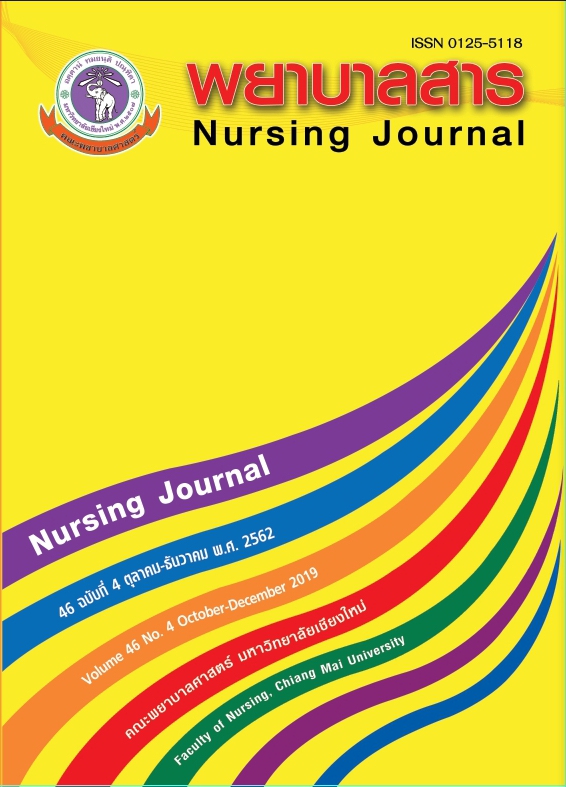Effects of Enhancing Self-Efficacy Programs on Perceived Self-Efficacy, Knowledge and Satisfaction in Breastfeeding Practice Among First-time Postpartum Mothers
Keywords:
Enhancing Self-Efficacy Program, Perceived Self-efficacy, Breastfeeding Knowledge, Satisfaction, First-time Postpartum MothersAbstract
This quasi-experimental research was to study the effectiveness of enhancing self-efficacy programs on perceived self-efficacy, knowledge, and satisfaction in breastfeeding practice among first-time postpartum mothers. The participants were sixty first-time postpartum mothers from the obstetric unit at Lamphun Hospital in Lamphun province, selected by purposive sampling. The participants were equally divided into two groups, the first group were assigned to the control group and received usual nursing care, whereas the second group were assigned to the experimental group which participated in the enhancing self-efficacy program and also received usual nursing care. Data collection instruments used were the demographic characteristics questionnaire, Breastfeeding Self-Efficacy Scale-Short Form, the breastfeeding knowledge questionnaire, and the satisfaction with breastfeeding questionnaire. Data were analyzed using descriptive statistics, independent t-test, and paired t-test.
The results revealed that 1) the mean scores of breastfeeding self-efficacy, breastfeeding knowledge, and satisfaction with breastfeeding of the experimental group after participation in the enhancing self-efficacy program, were significantly higher than before participating in the enhancing self-efficacy program (p < .001, p < .001, and p < .001 respectively), 2) the experimental group had a significantly higher mean score than the control group in breastfeeding self-efficacy (p < .05), but there were no significant differences in breastfeeding knowledge and satisfaction with breastfeeding.
The results from this study showed the effectiveness of enhancing the self-efficacy program. Therefore, it should be used to enhance self-efficacy of first-time postpartum mothers and to promote successful exclusive breastfeeding. Furthermore, the results can be used as a guideline for further research and study.
References
Arthibenyakul, C., Sangperm, P., Prasopkittikun, T., & Ngerncham, S. (2560). The effects of self-efficacy promoting program on perceived self-efficacy, efficiency of breastfeeding and breastfeeding rate among mothers of late preterm infants. Journal of Nursing Science, 35(1), 23-35. (In Thai)
Baiya, N., Ketsuwan, S., Pachaiyapoom, N., & Puapornpong, P. (2013). Mother’s knowledge, latch score and satisfaction after development of the breastfeeding support service in HRH princess Maha Chakri Sirindhorn Medical Center. Journal of Medicine and Health Sciences, 20(2), 17-23. (In Thai)
Bandura, A. (1977). Self-efficacy: Toward a unifying theory of behavioral change. Psychological Review, 84(2), 191-215.
Bandura, A. (1997). Self-efficacy: The exercise of control. New York: W.H. Freeman and company.
Butchan, P., Chamusri, S., & Singhala, K. (2016). Effects of breastfeeding promoting program on family members self-efficacy and breastfeeding promotion behavior in community. Journal of Nursing and Health Care, 34(4), 97-105. (In Thai)
Chanapi, S., Sinsuksai, N., Thananowan, N., & Phahuwatanakorn, W. (2014). Knowledge, attitude, self-efficacy, spousal and nurse support predicting 6-weeks exclusive breastfeeding. Journal of Nursing Science, 32(1), 51-60. (In Thai)
Cohen, J. (1988). Statistical power analysis for the behavioral sciences (2nd ed.). Hillsdale, NJ: Erlbaum.
Edwards, R. (2017). An exploration of maternal satisfaction with breastfeeding as a clinically relevant measure of breastfeeding success. Retrived October 6, 2019, Retrived from https://doi.org/10.1177%2F0890334417722509
Flagg, J. S. & Pillitteri, A. (2018). Maternal & child health nursing (8th ed.). China: Wolters Kluwer.
Horta, B. L. & Victora, C. G. (2013). Long-term effects of breastfeeding: A systematic review. Retrived October 6, 2019, Retrived from https://apps.who.int/iris/bitstream/handle/10665/79198/9789241505307_eng.pdf;sequence=1
Jager, E. D., Broadbent, J., Tyszkiewicz, M. F., Nagle, C., McPhie, S., & Skouteris, H. (2015). A longitudinal study of the effect of psychosocial factors on exclusive breastfeeding duration. Midwifery, 31, 103–111.
Khakhong, S. & Nirattharadorn, M. (2017). The effects of promoting self-efficacy program on breast feeding behavior among adolescent mothers in community. Journal of Public Health, 47(1), 31-43. (In Thai)
Kroll de Senna, A. F., Giugliani, C., Lago, J. C. A., Bizon, A. M., Martins, A. C., & Oliveira, C. A. (2018). Validation of a tool to evaluate women’s satisfaction with breastfeeding for the Brazilian population. Journal de pediatria, 1-8.
Loke, A. Y. & Chan, L. S. (2013). Maternal breastfeeding self-efficacy and the breastfeeding behaviors of newborns in the practice of exclusive breastfeeding. Journal of Obstetric, Gynecologic & Neonatal Nursing, 42(6), 672-684.
McCarter-Spaulding, D. & Gore, R. (2009). Breastfeeding self-efficacy in women of African descent. Journal of Obstetric, Gynecology & Neonatal Nursing, 38(2), 230-243.
Ngo, L. T. H., Chou, H. F., Gau, M. L., & Liu, C. Y. (2019). Breastfeeding self-efficacy and related factors in postpartum Vietnames women. Midwifery, 70, 84-91.
Nuampa, S., Sinsuksai, N., Phahuwatanakorn, W., & Chanprapaph, P. (2013). Personal factors, first feeding time and nurse support in predicting successful exclusive breastfeeding at discharge in mothers with cesarean section. Journal of Nursing Science, 31(2), 49-59. (In Thai)
Plodpluang, U., Srichan, A., & Kaewpraphan, S. (2016). Effect of breastfeeding promotion based on familial support program to knowledge, attitude and behavior of postpartum mothers and familiar’s members. Phranakhon Rajabhat Research Journal (Science and Technology), 11(2), 41-52. (In Thai)
Tantivetjakul, S. (2000). The effects of supportive-educative nursing on perceived barriers, satisfaction, and behavior of breastfeeding in adolescent mothers. Master Thesis of Maternal and Child Nursing, Mahidol University. (In Thai)
United Nations Children’s Fund. (2016). The state of the world’s children 2016: A fair chance for every child. Retrived October 6, 2019, Retrived from http://www.unicef.org/publications/files/UNICEF_SOWC_2016.pdf.
Vincent, A. (2015). The effect of breastfeeding self-efficacy on breastfeeding initiation, exclusivity, and duration. College of Health Sciences, Walden University.
World Health Organization. World health statistics 2015 [Internet]. Geneva: WHO: 2016 Retrived October 6, 2019, Retrived from http://www.who.int/gho/publications/world_health_statistics/2015/en/
Downloads
Published
How to Cite
Issue
Section
License
บทความที่ได้รับการตีพิมพ์เป็นลิขสิทธิ์ของวารสารพยาบาลสาร
ข้อความที่ปรากฏในบทความแต่ละเรื่องในวารสารวิชาการเล่มนี้เป็นความคิดเห็นส่วนตัวของผู้เขียนแต่ละท่านไม่เกี่ยวข้องกับมหาวิทยาลัยเชียงใหม่ และคณาจารย์ท่านอื่นๆในมหาวิทยาลัยฯ แต่อย่างใด ความรับผิดชอบองค์ประกอบทั้งหมดของบทความแต่ละเรื่องเป็นของผู้เขียนแต่ละท่าน หากมีความผิดพลาดใด ๆ ผู้เขียนแต่ละท่านจะรับผิดชอบบทความของตนเองแต่ผู้เดียว






